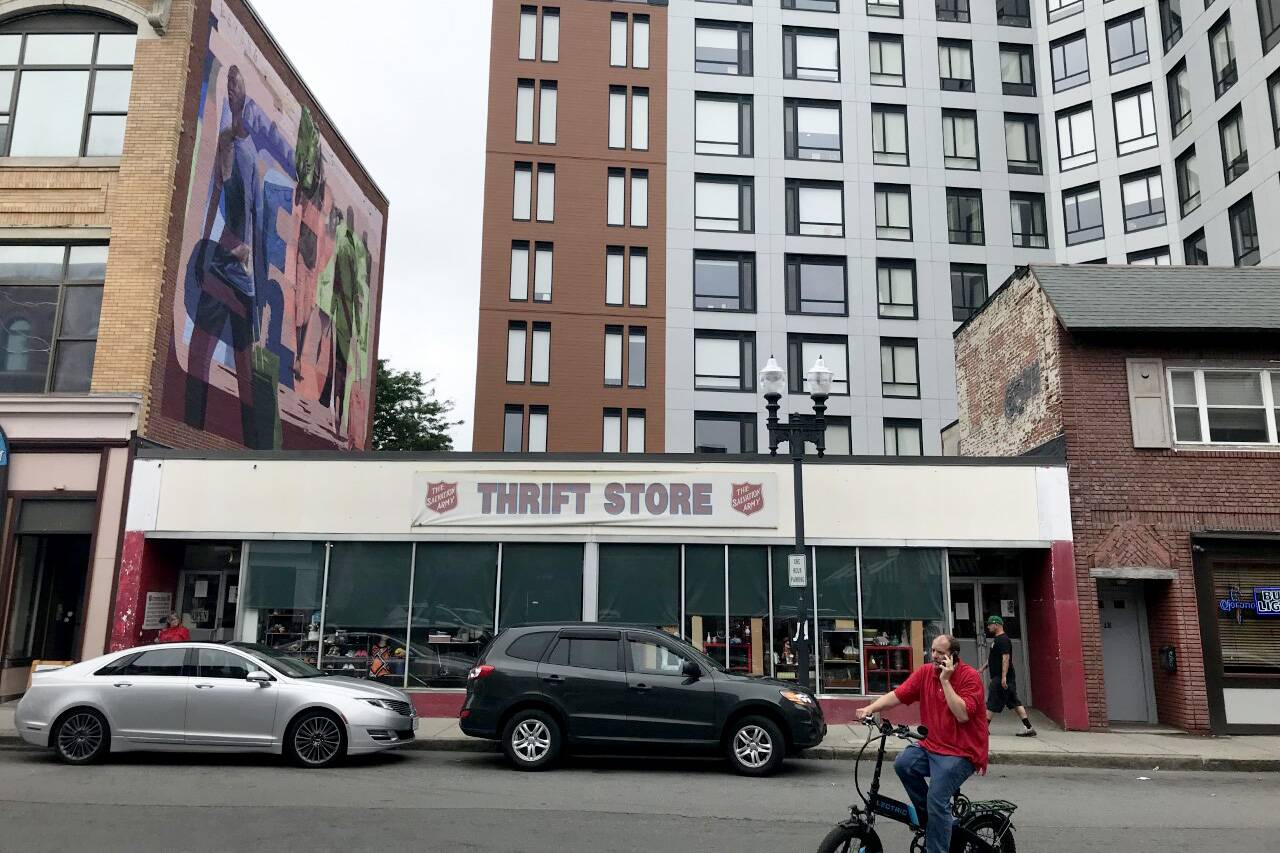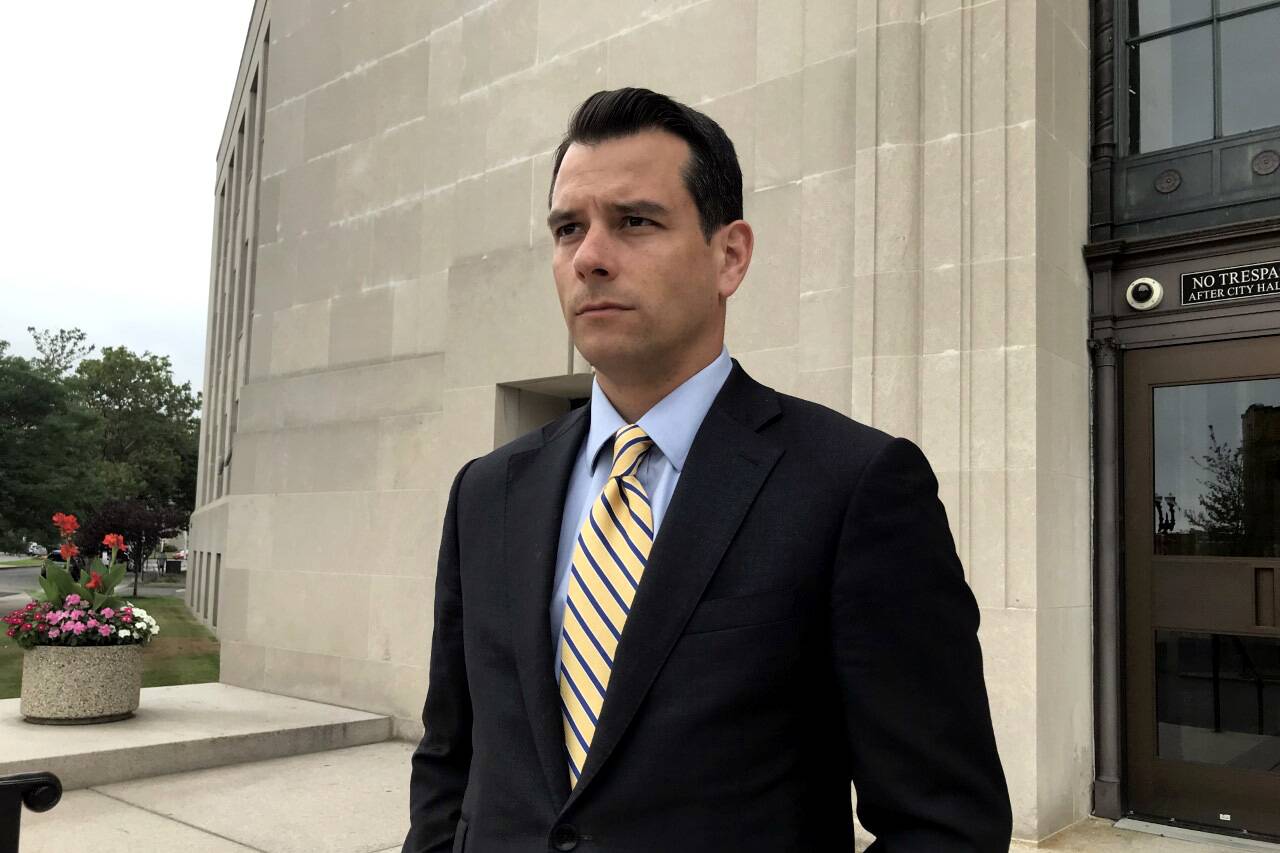By Boston-area standards, the city of Lynn is still relatively affordable. The median monthly rent for a two-bedroom in Lynn is currently $2,150, according to the website Zumper — almost a thousand dollars less than in Boston proper, which can be reached by car in 30 minutes or less.
For decades, Lynn’s location and lower cost of living have made it a magnet for new immigrants, many of whom hail from Spanish-speaking countries. According to U.S. Census data, 37 percent of Lynn’s 100,000-some residents were born outside the United States, and 43 percent identify as Hispanic or Latino.
But in 2022, as the housing pressures that have transformed nearby communities intensify within Lynn’s borders, it’s unclear if new arrivals of limited means will be able to continue finding and keeping home here like they have in the past.
Out-of-reach rent increases
Olga Valiente has called Lynn home for nearly a decade, with her time in the city showing what Lynn has been — and what it could become. Valiente says she immigrated from Guatemala aftera gang member threatened to kidnap her children. For the past three years, she and her three kids, who range in age from 8 to 17, have lived in a three-bedroom apartment off Lynn Common, in a fairly gritty part of town.
The quarters are close. Valiente’s son sleeps on an air mattress because there’s limited space, and her two daughters share a bedroom. Still, the ceilings are high, and the hybrid family room/dining room just off the kitchen is bathed in sunlight in the afternoon.
"We can barely make it to $1,900. ... Imagine when I have to pay all that increase."Olga Valiente, Lynn renter
What’s more, Valiente says, the location is ideal for her family.
“It’s close to the [kids’] schools and to Market Basket,” Valiente said through an interpreter. “The church I go to is close by. ... Like many other places, it has problems, but it’s still safe. I like the area.”
For years, the apartment had another big advantage: Valiente could afford it. Recently, though, her landlord told her that the rent was about to increase, from $1,900 to $2,100.
In theory, that’s still a good deal. The median rent for a Lynn three-bedroom is currently $2,800. But Valiente — who works as a cleaner — says that, for her, the new rent simply isn’t tenable long term.
“We can barely make it to $1,900,” she said. “Imagine when I have to pay all that increase.”
More Housing
Her children, Valiente added, ask: “What are we going to do? You’re both mother and father to us, and you’re the only one who works here. You feed us, you gave us the roof over our heads. So, what are we going to do now?”
Valiente’s landlord, Rosa Martinez, told GBH News that she, too, is an immigrant, and that she tries to keep the units she and her husband own affordable for tenants like Valiente, who she calls “my people.” But Martinez also said that given the realities of the real-estate market, there are limits to how accommodating she can afford to be.
“I can’t rent that apartment for $1,800 or $1,900,” said Martinez, who owns 28 units in the area. “It’s impossible. The money has to come from somewhere to pay those mortgages. ... Rent is so expensive because property is so expensive.”
The value of a single-family home in Lynn increased 157 percentbetween 2011 and 2021, according to Warren Group data provided to GBH News. Immigrant-rich communities across the state have seen similar home value increases, including Everett, Revere, Brockton and Lawrence.
Valiente’s predicament is a reminder that, for the most economically vulnerable Massachusetts residents, even small increases in the cost of living can be catastrophic — no matter how reasonable the bottom line might look from the outside.
The push for more affordable housing

Her case also casts doubt on the notion that production alone can solve the housing crisis in Massachusetts. A multitude of new housing developments are sprouting up in and around Lynn’s urban core, but they tend to feature smaller, more expensive units that seem to exist in a different universe than the one Valiente and her family occupy.
Case in point: the Caldwell, which opened downtown last summer on on the site of a former shoe factory and towers over an adjacent Salvation Army thrift store. It boasts a rock-climbing wall, a rooftop pool, coworking space and a pet spa — but no three-bedroom apartments. The Caldwell’s two-bedroom units start at close to $3,000.
The socioeconomic texture of Lynn development may be changing in the near future. When Lynn Mayor Jared Nicholson was elected in a landslide last year, he was clearly the more progressive of the two finalists when it came to housing policy. Nicholson, who was then a member of Lynn’s school committee, had played a key role in crafting the city’s new housing plan. His opponent, city councilor Darren Cyr, warned in a flyer that the plan’s focus on affordable housing would “attract out of towners in need of social services to Lynn.”
Later this year, Nicholson plans to unveil a proposed inclusionary zoning policy that would require developers building in the city to create new affordable housing, either on site or elsewhere, including units that are within reach for Lynn’s poorest residents.
“It’s certainly a top priority for our administration, and it’s one of the most pressing issues in the city,” Nicholson said.
But Nicholson’s plan comes with a caveat. It’s crucial, he says, that the new policy not be so demanding that developers currently interested in Lynn simply decide to go elsewhere.
“For inclusionary zoning to work, to be creating new affordable units, you need to continue to have projects that developers are putting forward and implementing,” Nicholson said. “And so you want to set the right balance — where you’re doing right by the residents who are struggling with affordable housing, doing right by the community, but also continuing to allow investors to make a return.”
As Nicholson weighs where, exactly, that balance should be struck, some advocates fear that he won’t go far enough.

Isaac Simon Hodes is the executive director of Lynn United For Change, which is working to help Olga Valiente remain in her apartment. Lynn United for Change endorsed Nicholson last fall. But Hodes warns that letting developers fund affordable housing elsewhere in the city, instead of providing it in the buildings they construct, would erode Lynn’s civic fabric.
“If we don’t do that, we are going to end up with segregated enclaves and potentially segregated neighborhoods that largely exclude the majority lower-income, working-class population that makes Lynn what it is,” Hodes said. “We’re going to end up with largely racially segregated areas, and that’s not the direction we should be going. ... It’s not in the spirit of what Lynn has been and should be about.”
Ideally, Hodes said, Lynn would mandate that at least 20 percent of the units in large- and medium-sized developments be “truly affordable” for residents of limited means. He also wants Nicholson and other Lynn politicians to join the growing movement to let Massachusetts cities and towns reinstitute rent control, which would require legislative action on Beacon Hill.
“We need to see city leaders actively and publicly fighting to change state law,” Hodes said.
Where to go?
Perhaps, in a few years, Olga Valiente and her children will benefit from whatever steps the city takes next to keep Lynn affordable for people like them.
For now, though, Valiente is pessimistic about the future — and at a genuine loss about where she can find an affordable, stable alternative.
“On the mountains, or under the bridge — I had a conversation with my children, and that’s where we always say we’re going to end up,” Valiente said. “We don’t know where we’re going to go, because we don’t have that amount of money.
“When I talk to them about that, it hurts,” she added. “It’s really hard.”
You can share your Priced Out story or ask a question you’d like answered by filling out this Google form. Find more from the series at Priced Out: The fight for housing in Massachusetts.




